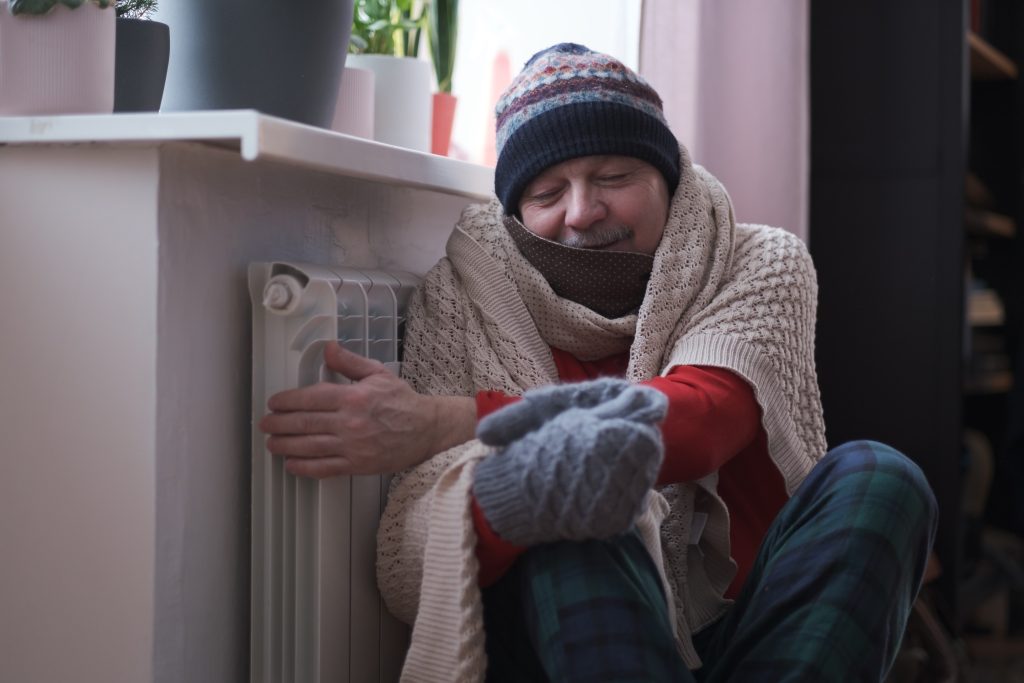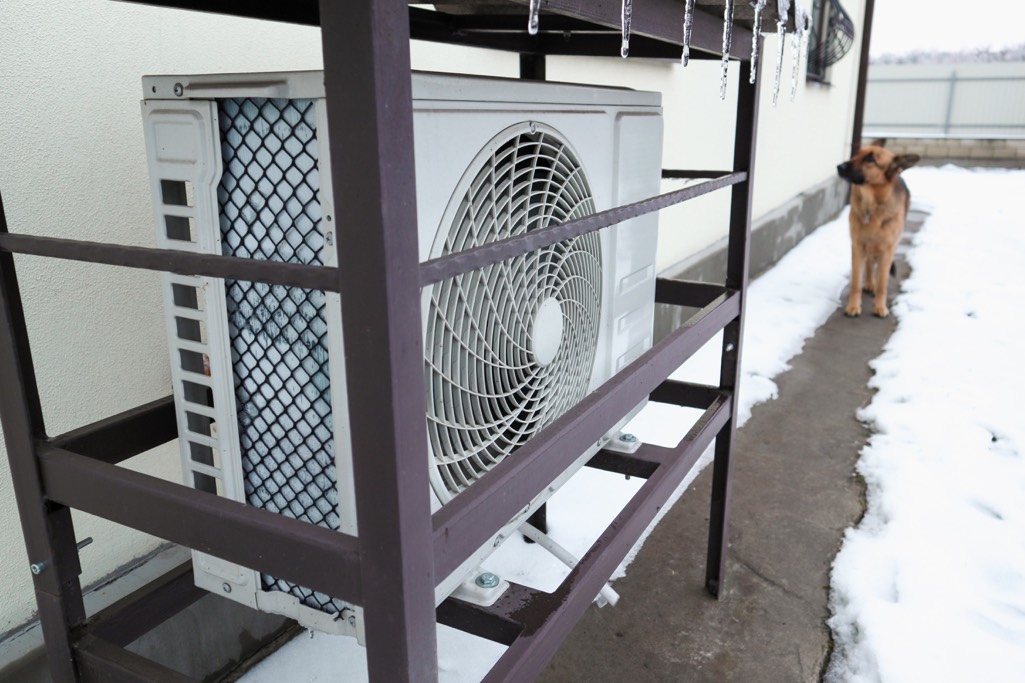Heat pump cold weather problems
Heat pumps should heat your home all year long, even when temperatures plummet. But there are a number of heat pump cold weather problems that can happen.
Are you having problems with your heat pump in cold weather? Find out what to look for, and how to fix it, below.
Heat pumps in cold climates
We’ve written on the site already about how heat pumps work in winter, when the outdoor air temperature is very low. In most climates, heat pumps are perfectly capable of heating your home all year round – although they may not be the most efficient way with really cold air outside.
It’s worth remembering that the most heat pumps in Europe are sold in Finland. This is a country with extremely cold weather in the winter season. If they are properly installed and have regular maintenance, heat pumps do work well in cold temperatures.
What to do when outdoor temperatures plummet
In most cases your heat pump should continue to keep you nice and toasty as the outside air gets colder. But occasionally you may run into a few issues keeping your heat pump working in normal operation.
Below is a list of the most common heat pump cold weather problems.
Heat pump cold weather problem one – your heat pump isn’t generating enough heat?
This is one of the most common problems that homeowners report. As the outside temperature gets colder their HVAC system is no longer performing as it should.
You might find that your heat pump struggles as temperatures plummet. Or you might find that the house just doesn’t seem warm enough no matter what you do.
Heat pump cold weather problem two – your unit is constantly running
Some homeowners report that their heat pump system is continually running during the winter months. Sometimes this is in conjunction with problem one. In other words, the system is constantly running and the house is still not getting warm enough.
Both of these problems have similar causes. We have listed the most common ones below. Some of them are a simple fix and some will be harder to solve. We recommend that you look into each in turn
The possible causes
You’re adjusting thermostat settings too much
If you’re used to a traditional gas boiler (natural gas furnace) then you might need to change the way you think about heating your home. We tend to set our boiler to come on a various times in the day (morning and evening usually). A heat pump system is generally designed to run continuously. This is a common misconception among homeowners.
Set the thermostat to the temperature you want and leave it. Be aware that a heat pump will take longer to heat up your home than a traditional gas heater.
The outside unit is blocked
If you have an air source heat pump (the most common in the UK), the outside unit takes heat from the outside air and compresses it to make it even warmer. This heat is then distributed inside. Air to air heat pumps do this via hot air. Air to water heat pumps do this via hot water in your radiators or underfloor heating.
It’s quite common for the coils of your heat pump to get blocked in the winter months. This can happen as leaves, dirt or snow build up on the outside of the unit. If your room temperature is not warm enough, the first thing you should do is check the outside unit. Carefully remove any build up and wait to see if temperatures increase.
The filter needs replacing
The air filter on a heat pump stops particle entering the machine and damaging it. You will need to replace or clean the filter on your heat pump every few weeks according to the manufactures instructions.
Not only will a dirty filter reduce the energy efficiency of your heat pump, but there’s a good chance it will also reduce its lifespan. Make sure your filter is clean.
Frozen outdoor unit
It’s normal to have a little frost on your unit in the winter months, But in some cases a coating of ice may develop. This can indicate an underlying problem with the HVAC system.
Most heat pumps have a defrost mode which will automatically unfreeze the coil. But if there is excessive water on the outdoor unit, this can be overpowered. Make sure there are no leaks on or around the outdoor unit.
Low refrigerant or refrigerant leaks
If this doesn’t work, your problem might be that there is not enough liquid refrigerant in the entire unit. A heat pump needs enough refrigerant to extract the heat from the outside air. This is not a problem you can fix yourself however and you will need to get an HVAC technician to look at it.
Technical issue
You may have a technical issue with a part in your heat pump. Typically this could be a faulty motor. But it could also be some other kind of malfunction. Again you will need an HVAC technician to examine the unit and possibly perform a heat pump repair.
You do not have enough insulation for your home
We’ve written quite extensively about this on the site. As a heat pump works at a much lower flow temperature a gas boilers (natural gas furnace), it’s vitally important that any heat generated in your home does not escape via air leaks.
Older homes in the UK are often built with single skin brick walls, and have single glazing with leaky windows and doors. If you live in an older home, without any modifications or thermal upgrades, your heat pump may be working fine, but is losing heat to the outside air.
When you heat pump was installed, your engineer should have performed a heat loss survey to identify what upgrades your home required. If you are sure there are no technical issues with your heat pump, make sure this survey was completed properly. If you have any doubts we advise you to get another one done by a different HVAC technician.
Your radiators are too small
In a similar vein, a heat pump generally needs larger, more powerful radiators to maximise the lower flow temperature. If you’ve recently switched over to a heat pump from a gas boiler, and you didn’t replace your radiators, then this might be the issue.
Again, a proper heating survey will be able to answer this question. Please see our advice for choosing an HVAC technician for more information.
Heat pump cold weather problem three – your system is blowing cool air
If your heat pump is blowing cool air on a cold day there could be a very simple explanation. Many heat pumps have a defrost cycle which kicks in when ice forms on the outdoor coils. During the defrost cycle the heat pumps directs some of the heat outside to melt the coil and get the system working properly again. It’s only temporary, but the heat pump is likely to blow hot air during this time.
This is only an issue for homeowners with an air to air heat pump. Air to water heat pumps do not have this issue. Air to air heat pumps have a reversing valve that can be used to blow cold air during the warm summer months. In this way the heat pump functions like an ac unit during hot weather. The reversing value is also used during the defrost cycle to keep your heat pump working effectively in colder temperatures.

Maximising heating energy efficiency in cold weather
Having said all the above, a heat pump might not be the most efficient heating option when it gets really cold.
The efficiency of heat pumps is measured using something called the seasonal coefficient of performance. Under normal circumstances an air source heat pumps returns a seasonal coefficient of performance of between 3 and 5. This means that for every unit of energy the system consumes, it outputs 3-5 times that in heat energy. A gas boiler only outputs around 90% of the energy it consumes.
However, in extremely cold weather this seasonal coefficient of performance reduces considerably. At lower temperatures the heat pump may even perform worse than conventional heating systems. This is especially true when you factor in the current price of electricity vs gas (Dec 23).
May homeowners who live in cold climates, or in areas which experience spats of cold weather, choose to install a backup heating system alongside their heat pump. This can be used when the temperature drops below a certain threshold and will help save money on your electric bills.
Is it time for a new heat pump?
The fact is that all machinery has a limited lifespan. Air source heat pumps generally last around 15-20 years – around 5-10 years longer than a gas boiler. Ground source heat pumps can last up to 25 years.
However, you will shorten the lifespan of your heat pump considerably if you do not perform regular maintenance on it. This is both a job for householders but also for an HVAC technician.
If your heat pump struggles in cold weather, and you’re having to fix it on a regular basis, it could be time for a new HVAC system. Check out our recommendations on the best heat pumps on the market.
If you do live in a particularly cold part of the country, you might want to consider a cold-climate heat pump which is specially designed for cold winters. This way, you may avoid some of the more common heat pump cold weather problems.
Are you thinking about heat pump installation?
The most common question we hear at WeLoveHeatPumps is around the cost. We have examined this in detail for both air source and ground source heat pumps.
Did you also know there are a number of Government grants in the UK that can save you up to £7,500 on the cost of a new heat pump installation? Please check out our guide to funding for more information.

